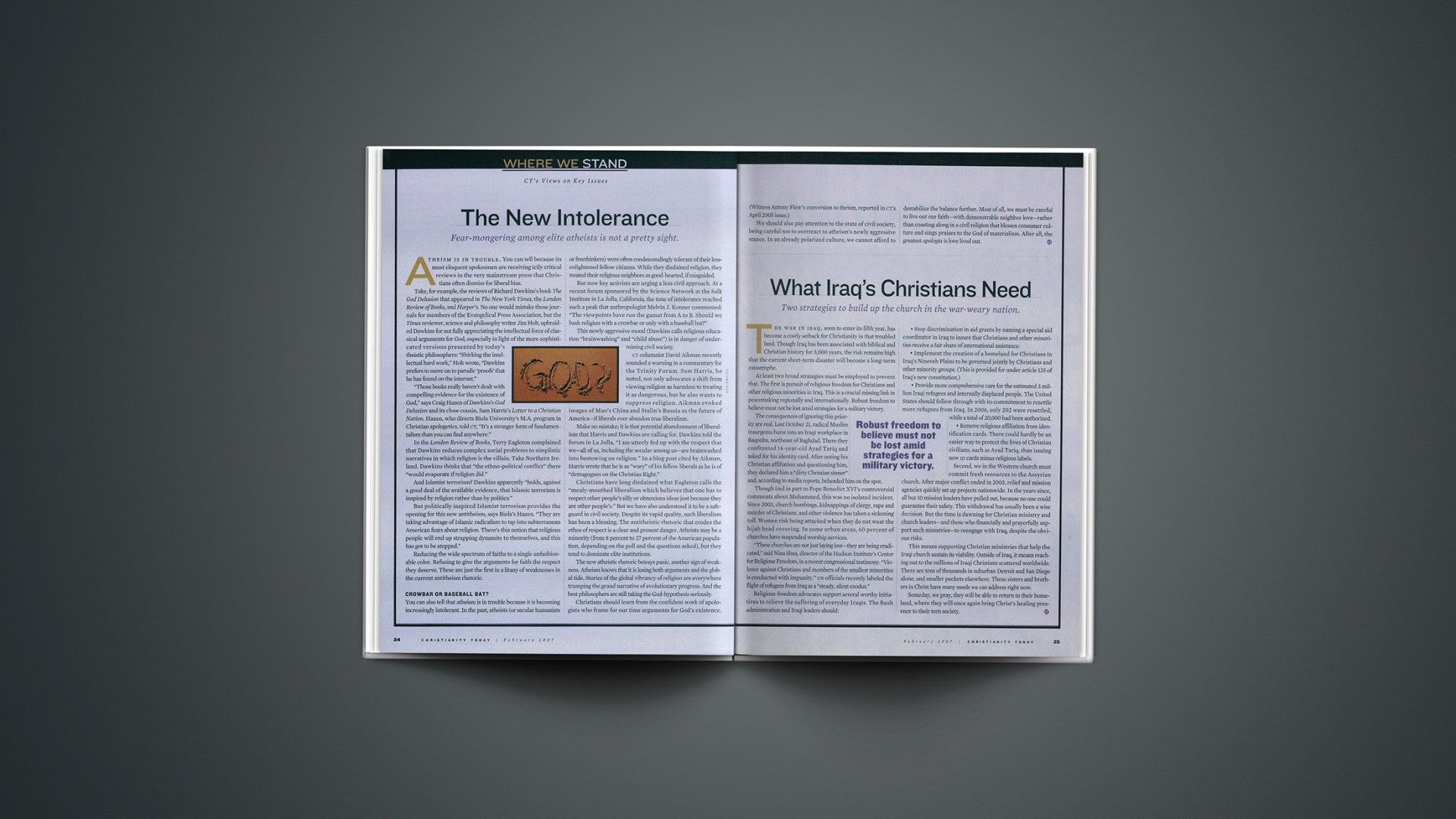The war in Iraq, soon to enter its fifth year, has become a costly setback for Christianity in that troubled land. Though Iraq has been associated with biblical and Christian history for 5,000 years, the risk remains high that the current short-term disaster will become a long-term catastrophe.
At least two broad strategies must be employed to prevent that. The first is pursuit of religious freedom for Christians and other religious minorities in Iraq. This is a crucial missing link in peacemaking regionally and internationally. Robust freedom to believe must not be lost amid strategies for a military victory.
The consequences of ignoring this priority are real. Last October 21, radical Muslim insurgents burst into an Iraqi workplace in Baqouba, northeast of Baghdad. There they confronted 14-year-old Ayad Tariq and asked for his identity card. After noting his Christian affiliation and questioning him, they declared him a “dirty Christian sinner” and, according to media reports, beheaded him on the spot.
Though tied in part to Pope Benedict XVI’s controversial comments about Mohammed, this was no isolated incident. Since 2003, church bombings, kidnappings of clergy, rape and murder of Christians, and other violence has taken a sickening toll. Women risk being attacked when they do not wear the hijab head covering. In some urban areas, 60 percent of churches have suspended worship services.
“These churches are not just laying low—they are being eradicated,” said Nina Shea, director of the Hudson Institute’s Center for Religious Freedom, in a recent congressional testimony. “Violence against Christians and members of the smallest minorities is conducted with impunity.” UN officials recently labeled the flight of refugees from Iraq as a “steady, silent exodus.”
Religious-freedom advocates support several worthy initiatives to relieve the suffering of everyday Iraqis. The Bush administration and Iraqi leaders should:
• Stop discrimination in aid grants by naming a special aid coordinator in Iraq to insure that Christians and other minorities receive a fair share of international assistance.
• Implement the creation of a homeland for Christians in Iraq’s Nineveh Plains to be governed jointly by Christians and other minority groups. (This is provided for under article 125 of Iraq’s new constitution.)
• Provide more comprehensive care for the estimated 3 million Iraqi refugees and internally displaced people. The United States should follow through with its commitment to resettle more refugees from Iraq. In 2006, only 202 were resettled, while a total of 20,000 had been authorized.
• Remove religious affiliation from identification cards. There could hardly be an easier way to protect the lives of Christian civilians, such as Ayad Tariq, than issuing new id cards minus religious labels.
Second, we in the Western church must commit fresh resources to the Assyrian church. After major conflict ended in 2003, relief and mission agencies quickly set up projects nationwide. In the years since, all but 10 mission leaders have pulled out, because no one could guarantee their safety. This withdrawal has usually been a wise decision. But the time is dawning for Christian ministry and church leaders—and those who financially and prayerfully support such ministries—to reengage with Iraq, despite the obvious risks.
This means supporting Christian ministries that help the Iraqi church sustain its viability. Outside of Iraq, it means reaching out to the millions of Iraqi Christians scattered worldwide. There are tens of thousands in suburban Detroit and San Diego alone, and smaller pockets elsewhere. These sisters and brothers in Christ have many needs we can address right now.
Someday, we pray, they will be able to return to their homeland, where they will once again bring Christ’s healing presence to their torn society.
Copyright © 2007 Christianity Today. Click for reprint information.
Related Elsewhere:
Christianity Today‘s full coverage area on Iraq has articles on the country’s Christians.
The Assyrian International News Agency lifts news stories from other publications without permission, but is comprehensive.
The Holy Apostolic Catholic Assyrian Church of the East has an official site, including a section that answers basic questions about the church’s origins and beliefs.
In its Iraq Emergency section, The website of U.N. High Commissioner for Refugees also has statistics on Iraqi refugees around the world and a summary of UNHCR spokesperson’s statements at an October press briefing.
Other news on Iraqi Christians includes:
Iraqi Christians Face Increasing Danger | The position of Iraq’s small but ancient Christian community is growing more tenuous, as militant Islamists attack churches and priests. Now some Iraqi Christians want to create a separate, autonomous enclave for their community on the Nineveh Plain of Northern Iraq. (NPR’s All Things Considered)
Iraq: Christian Minority Seeks Haven From Violence | A former Iraqi minister seeks to drum up support for the idea of a separate Iraqi province where Christians and other religious minorities can live in safety and peace. (Radio Free Europe)









